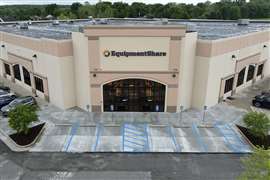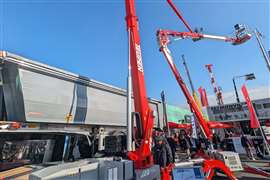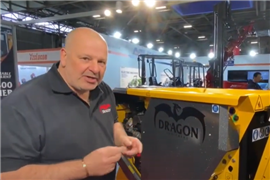China’s economic downturn could be to the powered access sector’s advantage. With access equipment sales set to take off in China, manybelieve it will hold back a boom and bust scenario. Euan Youdale reports.
Speaking during October’s BICES construction equipment exhibition in Beijing, China, Off-Highway Research’s Beijing-based senior consultant Karin Sun warned that the slowdown in the Chinese market was not over.
The organisation forecasts that unit sales of construction equipment could be 9% down this year, with only a modest 1% rise next year. Ms Sun said a particular problem for dealers was the large number of used machines being repossessed from customers. Many of the larger dealers in China now have hundreds of low hours used machines available. “That is why rental has become such a hot topic for dealers,” she said.
Powered access equipment is bucking the economic trend somewhat. As in other emerging nations access equipment is a new concept and in China the market is no more than 10 years old. Rental is a vital part of any strong access market, but unlike general construction machinery that is being sold off in its thousands in China, there are only up to 5000 units of powered access equipment in the country, and the sector is growing. Combined with the steady growth of rental, access has an undoubtedly strong future.
Possible growth
How steep that growth curve will be over the next five years is open to speculation, but anything between 10% and 30% seems possible. Most players in the Chinese access sector, however, would like to see a steady rise, rather than a bubble that will inevitably burst.
Last year revenues at Terex Changzhou Machinery, Terex AWP’s China subsidiary, increased by 50%, despite the economic downturn in China. Clint Weber, general manager at the subsidiary, tells AI that there will still be growth over the coming months, but it is likely to be slightly less than last year.
“Like in developed access markets rental is key. In the past rental was only found in the shipyard industry, but it has now developed to become a significant part of the market and is considered to be responsible for 60 – 70% of sales,” says Mr Weber. “Rental is a model that’s being followed here in China, and it is getting towards the situation found in Europe. Following the downturn companies are cash starved so rental is a good option and we are actively helping to grow and develop rental channels.”
There is also a new focus from Western manufacturers on the types of products that should be aimed at China. For example, Terex AWP has sidelined the scissor and boom lifts that it launched at Bauma China last year for the Chinese market. The 12 m Genie V1200 boom and 5 m push around Genie PS500 scissor were introduced as a low cost alternative for the Chinese market with stripped back features.
The company will now extend its existing range of booms and scissors at its subsidiary in Changzhou, China which are aimed at customers in the country and Asia Pacific.
Mr Weber explains that much changed in the two year design period of the V1200 and PS500. It was decided that Chinese customers would prefer machines from Terex AWP’s standard lines. “We have been evaluating what the market really wants. There is a need for speed and efficiency rather than downgraded products.
“Personal safety is becoming more critical, plus there are pay increases if 10 -12% a year, and productivity is starting to become an issue,” adds Mr Weber.
Xu Shugen, Dingli Chairman, claims that the Chinese manufacturer has 90% of the market share in China for powered access, with some 70% of those sales going to rental companies. This ratio of sales will remain the same, says Mr Shugen, because the growth of the access equipment market in China relies on the development of rental.
Mr Shugen said the company is working to build a comprehensive after sales and service division to rival that offered by Western manufacturers. It also plans to provide a renewed equipment service in which rental companies can pay for their equipment to be remanufactured, then bring it back into their fleets or sell it on to the used market. Alternatively, Dingli will buy back the equipment from the rental companies, upgrade it, and sell it directly to the used equipment sector in the country.
“The access equipment market in China is so young, a developed after sales service has not been possible until now, but now it is needed because without it the life of a machine is greatly reduced and the value deflated after two to three years.
Henan Jiange Crane Co., also known as JHC, is the third biggest industrial gantry crane producer in China and in 2011 expanded into aerial work platforms to meet demands in the market. The company now has three electric scissors and three rough terrain scissors up to 18 m working height in its fleet, as well as four telescopic booms up to 26 m and one electric boom.
Joe She, JHC sales manager, said the company was selling 100 scissors a month but hardly any booms. “shipbuilding is the main market for booms, otherwise they are buying Western brands. “Our main customers are in rental; that is really growing.” An example of rental development, says She, comes from rental company Shanghai Shengshou which started six months ago with three JHC scissors and now has 30 in its fleet. The main application being factory construction. “At the moment other applications are very few. More primitive means are still used for most applications like window cleaning.”
The company hopes to grow three times in size in the next five years, mainly selling in the Chinese market. “We hope to improve our quality, and aim for Asian export markets and Latin America. But our price is much lower (30% – 40%) than Western manufacturers and this is a cash buying market, so price is very important.” A 10 m JHC scissor costs about RMB 100000.
Export
Looking outside China, 60% of Dingli’s machines are exported with 20% of those going to Germany. North America is firmly in Dingli’s scope, following a visit from a major manufacturer from the USA at the Dingli booth during the BICES exhibition, Mr Shugen tells AI.
Mantall export manager Mike Wuang forecasts that in 12 months time the Chinese access market will have grown to 10000 a year. The company was showing its new 16 m working height XE 160W scissor at BICES.
The company says it will see how the model was received in China, then it will be exported – it is already CE marked. Also on show were new compact scissors the XE50MINI/ED and the XE60MINI/ED, with 5 m and 6 m working heights, respectively. They are designed for the export market, particularly Europe, says Mr Wuang. “The compact scissor is not good for the Chinese market – it is more suitable for Europe and we are aiming machines at Western Europe. “Currently we are not selling any units in the USA as we do not have ANSII, but we will have that in the next one to two years.”
He adds that 80 units had been sold to Europe this year, with the company exporting 30% of its products, most of which are going to South America, Middle East, India, Eastern Europe and Turkey. This year Mantall started concentrating on the ASEAN region, including the established Singapore market and the fledgling Indonesia, Thailand, Vietnam and Cambodia markets. So far 100 units have been sold there, mainly to Singapore.
New US/Chinese joint venture aerial work platform company Jiangsu Eastman Heavy Machinery (EHM) is producing products aimed at the US, Europe and China. The company is partnered with US-based consulting company Technology International Co. and was presenting itself for the first time at BICES. One of the new products is the E12 Master series all electric vertical mast available in 14 feet and 18 feet platform heights.
EHM president Mike Zou says he is in talks with a major US manufacturer to sell the E12 under a cross sales agreement in the west. The manufacturer also has a range of scissors, self propelled booms, trailer mounted platforms and tracked platforms that are either production ready or in research and development stage. They are all aimed at China and other emerging nations in the Middle East, South America, as well as Russia. Among the production ready products is a four model scissor range and eight telescopic and articulated self propelled booms.
Before starting the company Mr Zou was president of Chinese manufacturer Zoomlion’s Speciality Vehicle Division. He spent 26 years in the US during which he has always been associated with AWPs and helped write the ISO TC214 standard for aerial work platforms.
“I think there will be very strong growth in China in the next three to five years,” says Mr Zou. “It is hard to say exactly what that growth could be but one fifth of the US market size is possible.”
On the subject of safety he adds, “Safety is becoming more important, accidents are causing exponentially higher costs.”
JCHI set to produce AIRO lifts in china
Beijing Jincheng Heavy Industry (JCHI) is set to open a new factory in China to potentially manufacture Airo platforms. JCHI, which already produces its own platforms in China, took majority ownership of Italy-based manufacturer Airo in February last year
Michelle Yu, director of marketing at JCHI, said it had been looking to buy a manufacturer of high quality access equipment for some time, and took the opportunity to acquire Airo at an attractive price following the slump in the Italian economy. JCHI produces its range of crane and access products, including articulating and telescopic booms, scissors, tracked platforms and vertical masts, in Beijing. They are aimed at the Chinese and Asia Pacific markets primarily.
Airo’s products are currently produced in Luzzaro Italy for the international market – the company also has offices in France, Spain and Brazil. That may be set to change with a new factory in China which would see Airo products aimed at China and the surrounding region.
“The idea is to have a sales network for both companies through Asia Pacific and Europe, but we will keep the two brands.” says Ms Yu,” The Airo products are more expensive and we want to reduce their price, so we may build a factory for them in China. “The construction market for access equipment in China is very small, but it will grow in the future. There is a trend for big construction projects with foreign contractors to use many access platforms. Airo products are high quality and better suited to general construction.”







